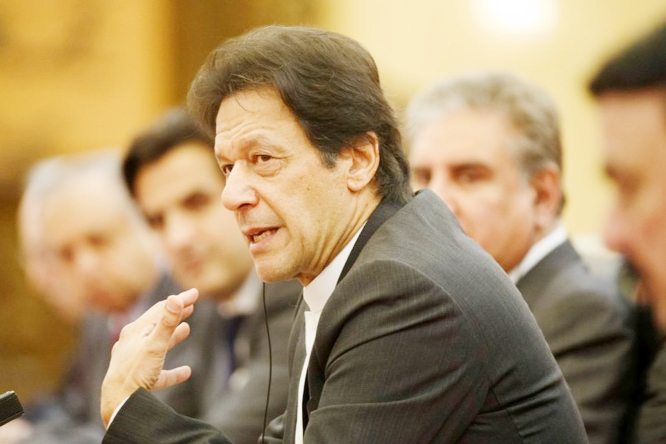
Reuters, Islamabad :
Prime Minister Imran Khan said on Tuesday Pakistan was ready to cooperate with India in its investigation of a deadly bombing in the disputed Kashmir region last week, which India blamed on Pakistan, but warned of retaliation if attacked.
Tension between the nuclear-armed neighbors has risen sharply over the killing on Thursday of 40 Indian paramilitary police in a suicide bomb attack claimed by the Pakistan-based Jaish-e-Mohammad (JeM) militant group.
Pakistan has denied any involvement and called for U.N. intervention. But Indian Prime Minister Narendra Modi, facing a general election by May, has come under pressure to exact revenge, and has said he has given his security forces a free hand to administer a “strong response”.
India’s top military commander in Kashmir told mothers to get their militant sons to surrender or see them dead, as security forces intensified a crackdown in response to the deadliest attack on security forces in three decades of insurgency in the Muslim-majority region.
In a televised address, Khan said Pakistan was ready to take action against anyone found to be behind the bomb attack.
“If you have any actionable intelligence that Pakistanis are involved, give that to us, I guarantee you that we will take action,” Khan said in the address to the nation.
Pakistan’s military has a long record of nurturing militants as proxies in pursuit of foreign-policy objectives, and India has for years accused it of supporting separatist militants fighting a nearly 30-year revolt in its only Muslim-majority state.
Muslim Pakistan has long said it only provides moral and diplomatic support to the Kashmiri people in their struggle for self-determination, though that has never dispelled India’s conviction of Pakistani support for militants.
“I am telling you clearly that this is new Pakistan. This is a new mind set, this is new thinking,” Khan said.
The South Asian neighbors have fought three wars since 1947, two of them over Kashmir. They have fought countless skirmishes along their de facto border, which the United Nations monitors, in the Himalayan region.
Prime Minister Imran Khan said on Tuesday Pakistan was ready to cooperate with India in its investigation of a deadly bombing in the disputed Kashmir region last week, which India blamed on Pakistan, but warned of retaliation if attacked.
Tension between the nuclear-armed neighbors has risen sharply over the killing on Thursday of 40 Indian paramilitary police in a suicide bomb attack claimed by the Pakistan-based Jaish-e-Mohammad (JeM) militant group.
Pakistan has denied any involvement and called for U.N. intervention. But Indian Prime Minister Narendra Modi, facing a general election by May, has come under pressure to exact revenge, and has said he has given his security forces a free hand to administer a “strong response”.
India’s top military commander in Kashmir told mothers to get their militant sons to surrender or see them dead, as security forces intensified a crackdown in response to the deadliest attack on security forces in three decades of insurgency in the Muslim-majority region.
In a televised address, Khan said Pakistan was ready to take action against anyone found to be behind the bomb attack.
“If you have any actionable intelligence that Pakistanis are involved, give that to us, I guarantee you that we will take action,” Khan said in the address to the nation.
Pakistan’s military has a long record of nurturing militants as proxies in pursuit of foreign-policy objectives, and India has for years accused it of supporting separatist militants fighting a nearly 30-year revolt in its only Muslim-majority state.
Muslim Pakistan has long said it only provides moral and diplomatic support to the Kashmiri people in their struggle for self-determination, though that has never dispelled India’s conviction of Pakistani support for militants.
“I am telling you clearly that this is new Pakistan. This is a new mind set, this is new thinking,” Khan said.
The South Asian neighbors have fought three wars since 1947, two of them over Kashmir. They have fought countless skirmishes along their de facto border, which the United Nations monitors, in the Himalayan region.

